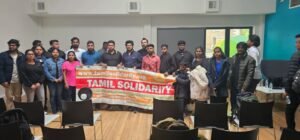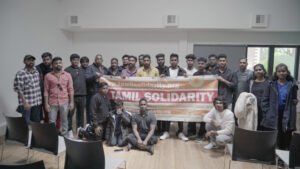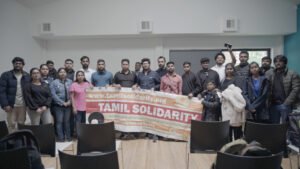
Tens of thousands of Tamils participated in Mullivaikal Day (also referred to as Tamil Genocide Remembrance Day) events across the world on May 18. While people gathered to remember the loss of countless lives, many also expressed anger and frustration. Sixteen years have passed since the massacre and the brutal end to the war, yet not a single war criminal has been brought to justice. Tens of thousands who disappeared remain unaccounted for, and many victims of the war are still forced to live in poverty. The unhealed scars of war continue to be felt deeply.
What was particularly notable this year is the participation of the new generation of Tamils, who joined the protest movement in large numbers. In Jaffna, hundreds of students gathered at the University of Jaffna’s Mullivaikal memorial statue to mark the day. This event was organized by the University’s Student Union. Students had to fight for the right to preserve this statue, despite repeated attempts by government authorities and parts of the university administration to remove it (source).

In stark contrast, enormous monuments erected for the military—what the government calls “war heroes”—still stand tall in areas where tens of thousands perished. These are the only monuments officially permitted, and they are heavily guarded by the military. The population tolerates these symbols of humiliation only out of fear. If it were up to the public, these war hero monuments would have been destroyed long ago.
It is in this context that there is strong and growing support among Tamils to mark Mullivaikal Day with greater intensity and visibility. On May 10, a special Mullivaikal monument was unveiled in Brampton, Ontario, Canada. The Sri Lankan government responded by summoning the Canadian envoy in Colombo to express its “strong objections.”
Meanwhile, the so-called “left” government led by the pseudo-Marxist JVP continues the tradition of organizing Victory Day (also known as National War Heroes Day) on May 19—just one day after Mullivaikal Day. The Patriotic National Front, led by former JVP leaders, has called on all Sri Lankans to raise the national flag on that day. President Anura and many in the government ministers are expected to attend the Victory Day celebrations.
During the mass protest movement (Aragalaya) in 2022, many activists demanded an end to these humiliating Victory Day celebrations. The Tamil Solidarity campaign worked with grassroots activists and made an open appeal to the movement to acknowledge the plight of the Tamils and to end the glorification of war. Many Tamils and other participants in the movement echoed this call. A significant number of activists recognized the humiliation these celebrations inflict on the Tamil-speaking population.
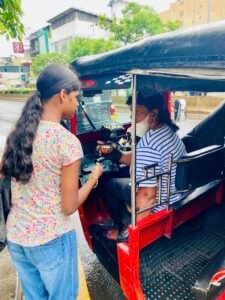

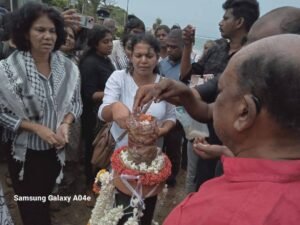
Some activists proposed including the remembrance of the Tamil massacre as part of memorialising the protesters killed by the Rajapaksa regime. A section of activists continues to mark Mullivaikal Day in Colombo, often at the original Aragalaya protest site. Though small in scale, these remembrance events are symbolically powerful. A commemoration also took place in Colombo on May 18. The United Socialist Party (USP)—a party that stands for democratic and national rights, including those of Tamils—took part.

Many families and activists also gathered in the Mullivaikal area, where so many perished. This event was particularly heartbreaking for many, as grieving relatives sat in front of the remembrance flowers, crying for a long time—releasing the deep pain and sorrow they continue to carry.
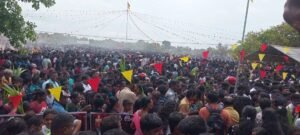

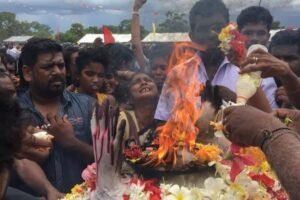


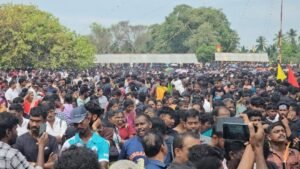
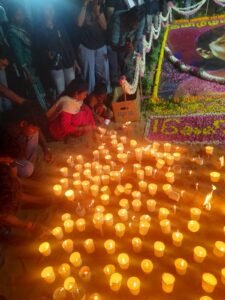



The May 17 Movement in Tamil Nadu also held remembrance events. Similar gatherings and meetings were organized in Canada, Australia, France, Germany, and nearly every country where the Tamil diaspora resides.
In Britain, the usual Mullivaikal Day remembrance events were also held outside Parliament Square. While supporting the organization of these events, Tamil Solidarity (TS) continues to argue for more explicitly political events to be held on this day. TS consistently points out that Mullivaikal is not just a day of defeat or mourning, but also a milestone in the political movement of Tamils. In 2009, tens of thousands took to the streets in defiance during the months of relentless killings.
TS stated:
“It is a day in history that raises the question of what is the best perspective and strategy needed for building the fightback. The place named ‘Mullivaikal’ is now a political term. Mullivaikal cannot just be classed as a day of genocide but also the beginning of a clear-cut political fightback.”
Hence, Tamil Solidarity appeals to all diaspora organizations to mark this day as a day of political mobilization. All organizations should publicly clarify the strategy and politics they aim to advance, and the work they are doing toward that goal. This day should be used as an opportunity for political education, debate, and discussion about the best way forward for the Tamil struggle.
This day should not be reduced to another Martyrs’ Day or simply a day of sorrow.
Tamil Solidarity has also protested against how some remembrance events are conducted. The act of raising British, Canadian, or American flags, or playing their national anthems at these events, is viewed as an insult to those fighting repression and impoverishment at the hands of those very states. TS also strongly opposes the invitation of right-wing politicians, including members of the Conservative Party, to speak at these events. These individuals have done nothing to support the rights of Tamils or other oppressed people. Those who refused to condemn the slaughter of Palestinians and who maintain close ties with the Sri Lankan government should not be allowed to “decorate” the stages during Mullivaikal Day.
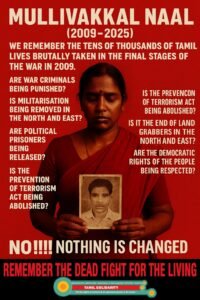



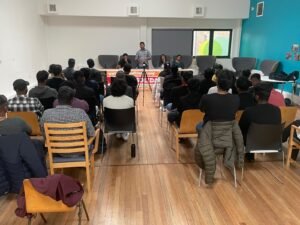
Ragavan, a core committee member of Tamil Solidarity, highlighted these points at the political meeting organized by TS on Mullivaikal Day. Over 70 members and supporters attended this event. Ragavan explained that TS holds political exhibitions every year, highlighting the history, genocide, and the protest movement—to prepare the next generation for the struggle. This struggle must be based on a clear perspective and objective, and stand in solidarity with all oppressed peoples.
Raviba explained why we cannot trust institutions such as the United Nations (UN) or any Western government to deliver justice for Tamils. Despite overwhelming evidence being collected and submitted to the UN, no real action has been taken. The most the UN has done is pass compromised resolutions politely asking the Sri Lankan government to conduct its own investigations. The government, however, has repeatedly confirmed that it will go no further than the discredited “Lessons Learnt and Reconciliation Commission”, a sham mechanism set up by the Rajapaksa regime—the very regime that spearheaded the massacre and established Victory Day.
It took 16 years for just four war criminals to be publicly named and issued travel bans—even though this information was available since 2009. It was a mass movement, not international diplomacy, that ousted the Rajapaksa regime. Such powerful mass action, with clear demands and perspective, will be essential to winning justice for Tamils, Raviba explained.
Saarankan, another TS core committee member, spoke about the role of Tamil youth in politics. He warned that activism is currently dominated by the privileged few, those who can “afford” to be politically active, or those who are paid for their involvement. He emphasized the need to resist the NGO-ification of the Tamil struggle, and called for wider youth participation to change this situation.
Lawanya, TS core committee member and Refugee Rights Coordinator, spoke about the latest developments related to the UK government’s “white paper” on immigration. Under pressure from far-right propaganda, the current British government is proposing to implement policies even more extreme than previous Conservative administrations. While being responsible for many wars and economic devastation globally—which have created over 60 million refugees—European governments, including Britain, are building “Fortress Europe”, only welcoming the rich or highly skilled. War victims and those fleeing atrocities are being detained in heavily guarded camps, or deported back to the dangers they escaped.
TS will continue to organize against this hostile environment and defend the rights of all victims of war. Lawanya urged anyone in need of support to contact TS to learn about their rights and to organize together.
Finally, Senan outlined some key points for building the struggle ahead, and attendees participated in a discussion following the meeting.
